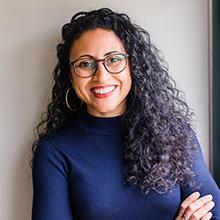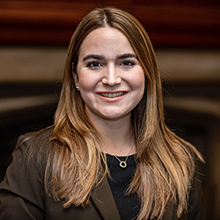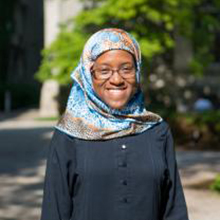A highlight for students and graduates, the Alumni-in-Residence program marks a successful year
The program includes workshops, speaker sessions, and one-on-one networking to help grow career connections and the UChicago community.
By Sarah Steimer
In its third academic year, the Alumni-in-Residence (AiR) program has again answered the question of “how?” For students, it’s about how to overcome any nerves around networking with and learning from UChicago graduates. And for alumni, it’s how to give back in a different way to give back to their alma mater.
SSD introduced its AiR program in Winter 2021, designed in particular to provide students with insight into where their UChicago degrees could take them — sectors that include research and higher education, government, private industry, and self-employment. The 2023-24 cohort consisted of five alumni, who engaged with the Division’s programs and students by way of one-on-one conversations, engagements with departments and degree programs, group events, and other programming. And any student was welcome to participate.
“It was a no-brainer for me to become an AiR because the UofC community has always meant so much to me,” says Rupal Patel, MA'05, who completed his degree with the Committee on International Relations. “There is something about being a Maroon that really becomes a part of you and my time at Chicago shaped me as a person — and shaped my mind — in ways no other experience has. As a member of the community I want to do whatever I can to strengthen and support it, and being AiR is a great way to give back.”
To give some context of the alumni experiences with which students could engage, Patel is a former CIA officer, two-time CEO, bestselling author, and leadership and talent development consultant.
Hers is the sort of career that drew many students — particularly those curious to learn more about opportunities that their degrees could afford them outside of academia. That included Veronica Vazquez-Olivieri, a PhD candidate in the Department of Psychology, who learned about the program through communications from program coordinator Chaevia Clendinen, Associate Dean for Students, Advancement and Student Services.
“These events are tailored to benefit students and create a welcoming no-pressure environment,” Vazquez-Olivieri says. “As a bonus, the events usually have lunch, so it is a low-stakes situation that exposes students to experiences from outside academic careers. Students simply need to show up and have the opportunity to ask questions and connect with the speaker outside of the event. The alumni that are invited are eager to help, share their experiences and advice, and network with students.”
The program was the catalyst for Vazquez-Olivieri to connect with Tara Schwegler, AM'94 MAPSS, PhD'04 Anthropology, at the 2022 Welcome Event. Since then, Schwegler — part of the 2022-23 cohort and a senior lecturer at the University of Texas at San Antonio, as well as the co-founder and director of research strategy at RedSquared Consulting — has become an “invaluable” mentor to Vazquez-Olivieri.
“It was because of her recommendation that I landed my first industry role in 2022, which opened the opportunity for an additional internship in 2023 and ultimately propelled my career into user research,” Vazquez-Olivieri says. “This exemplifies the value of AiR: It allows eager students to connect with talented alumni who can become mentors and, through their own networks and connections, help jumpstart careers.”
According to Clendinen, this year’s AiR cohort was enthusiastic about their participation and provided invaluable advice. For example, she highlighted Patel’s feedback to students on how to network, introduce themselves, show your progress, and seek out jobs within those networks.
“It was majority women in the room, and there was a sense of shyness about putting themselves out there and how it would be perceived,” Clendinen recalls of Patel’s AiR group event. “She (Patel) spoke really eloquently … I had a lot of students who requested to be connected with her.”
Vazquez-Olivieri underscored how crucial the program is for students who find networking to be daunting, especially if they have little experience doing it. And Patel reflected on her own experience reaching out to UChicago alumni — sometimes in a cold call — and how she was always met with warmth. For her, the question of being involved with her alma mater was less “how,” and more, “why not?”
 THE UNIVERSITY OF CHICAGO
THE UNIVERSITY OF CHICAGO




